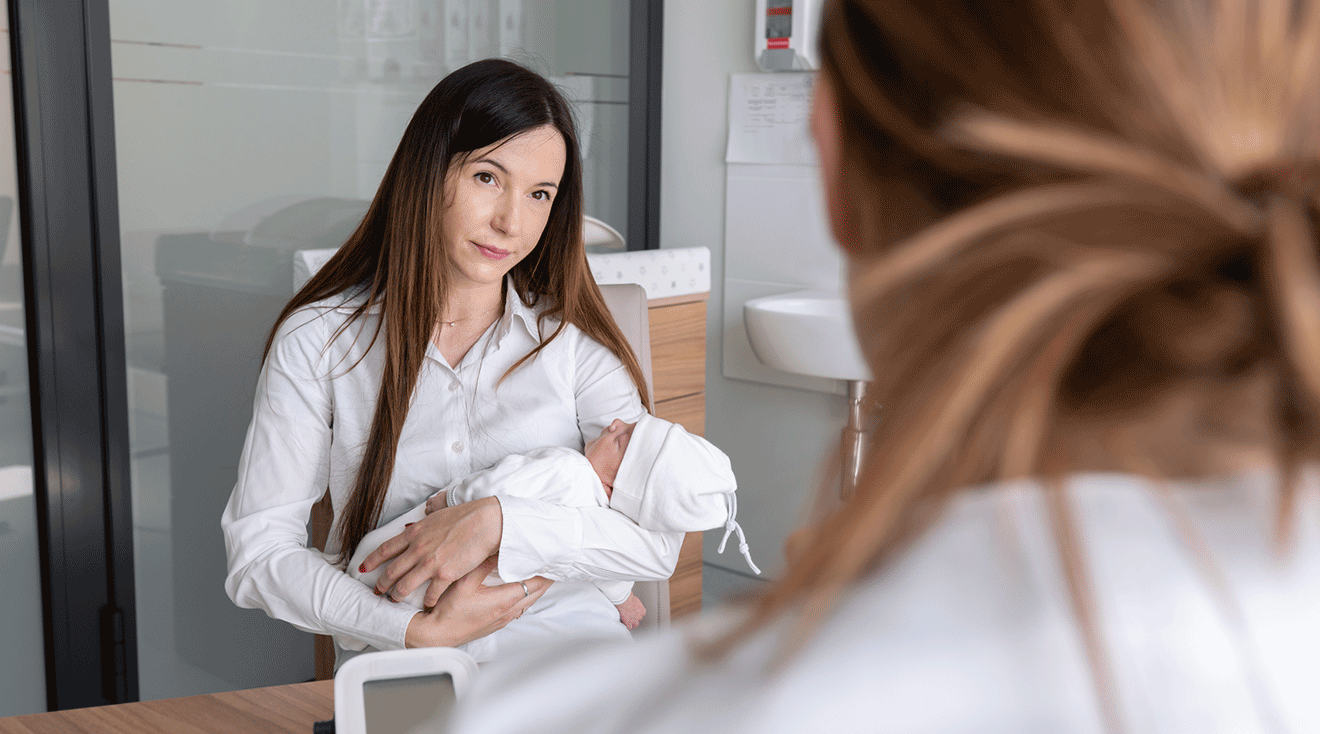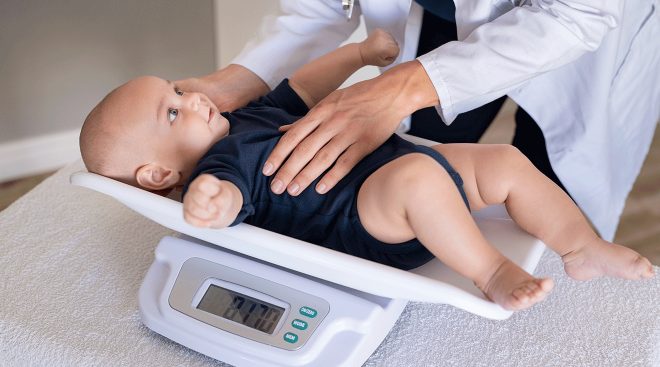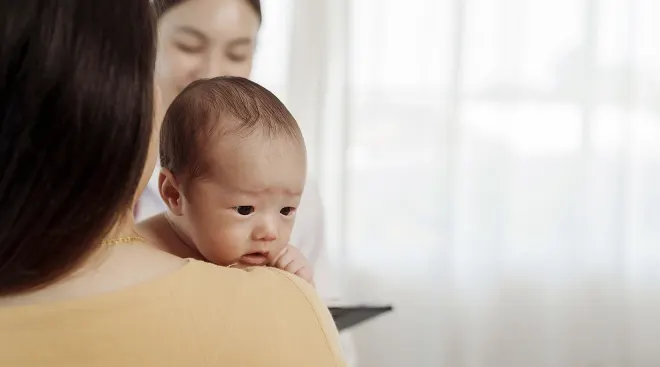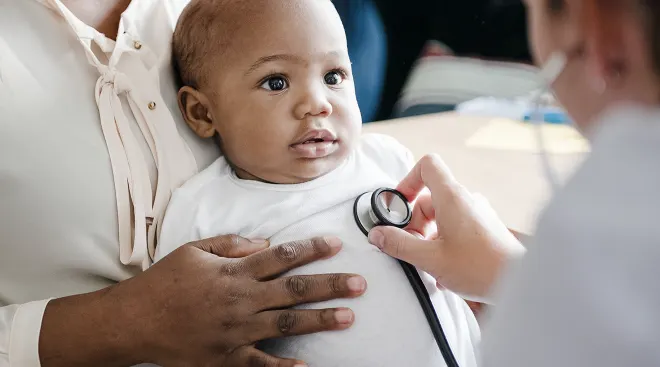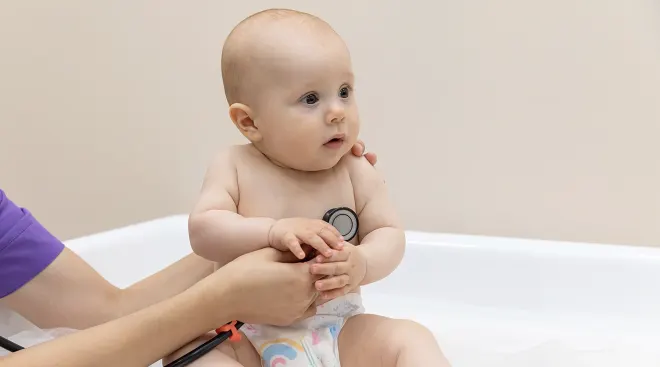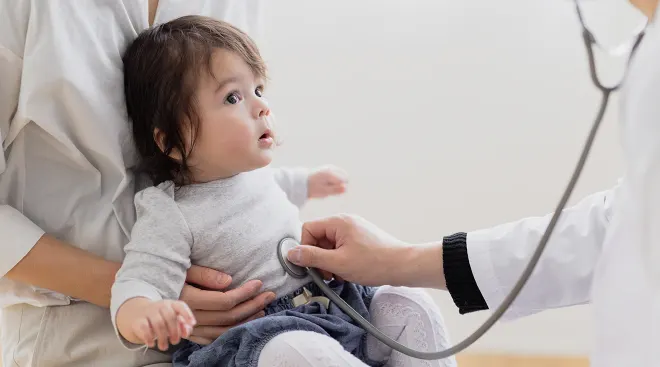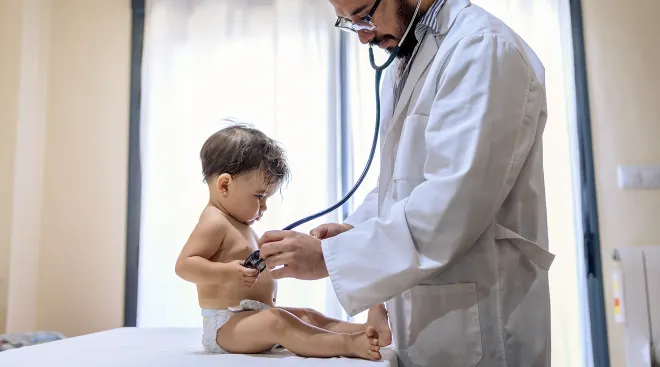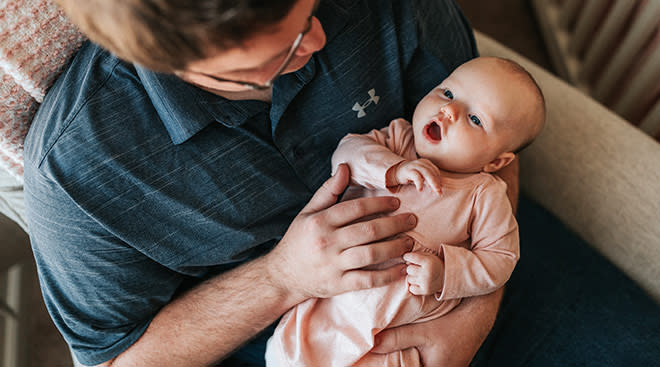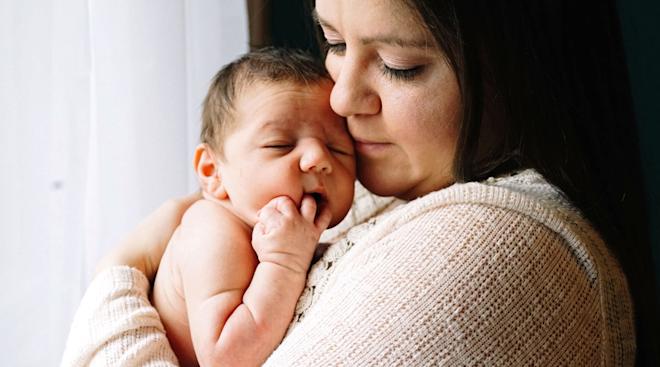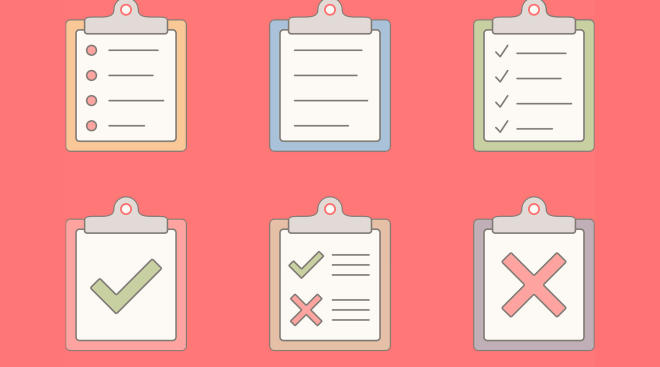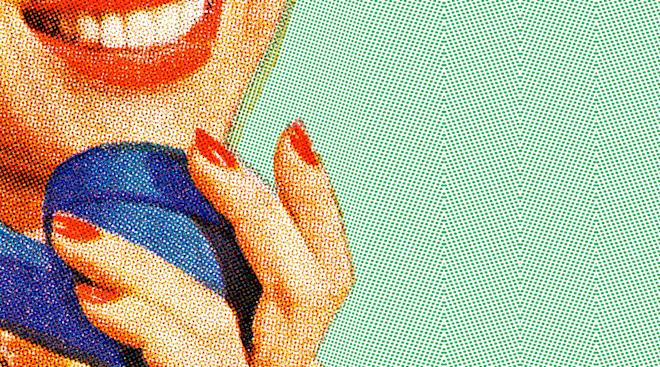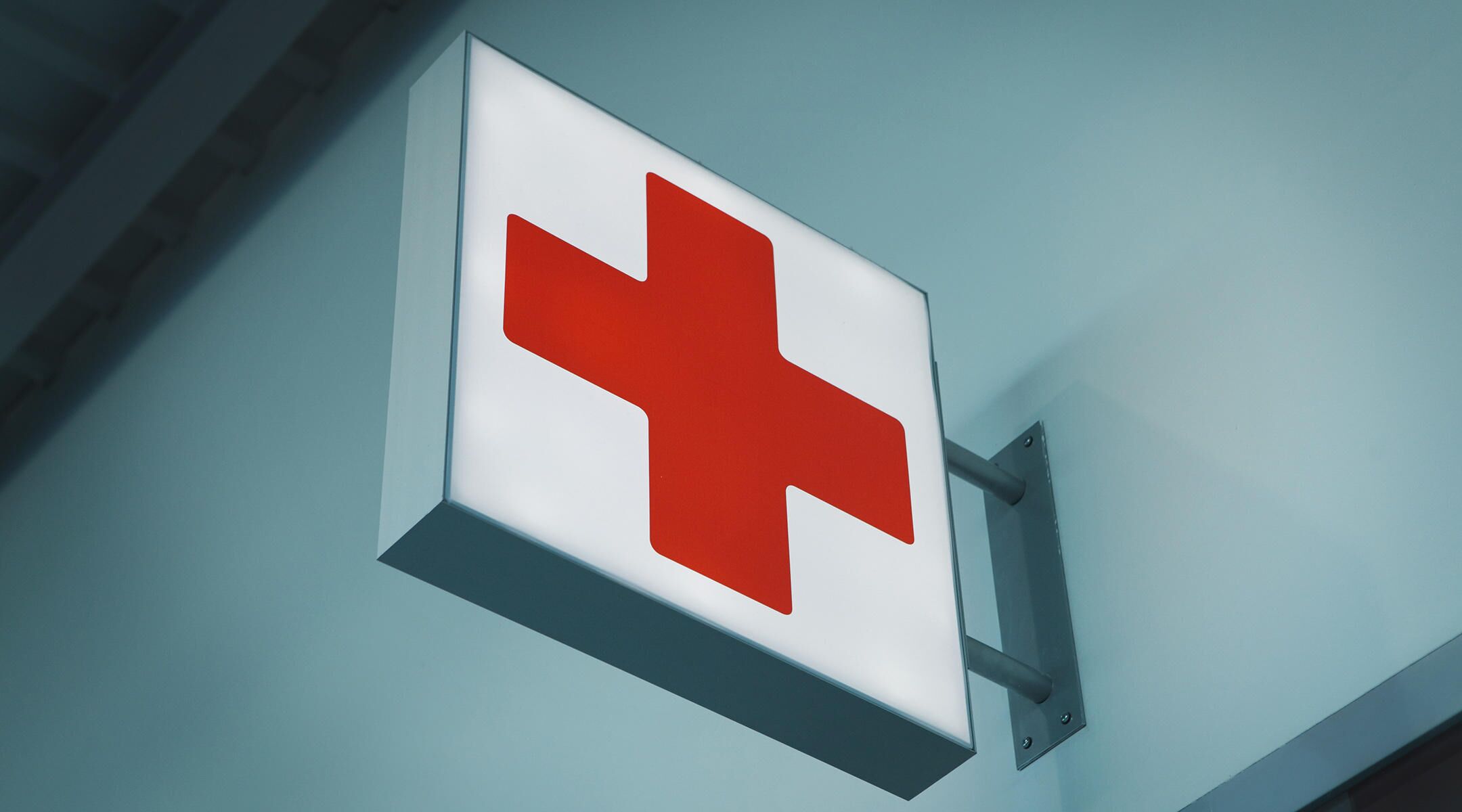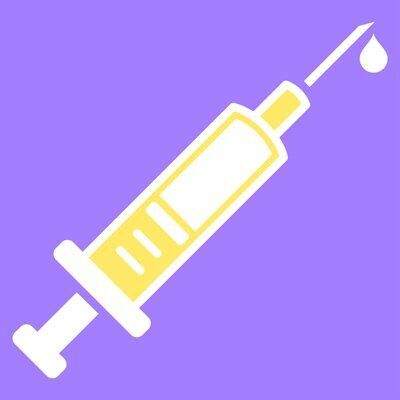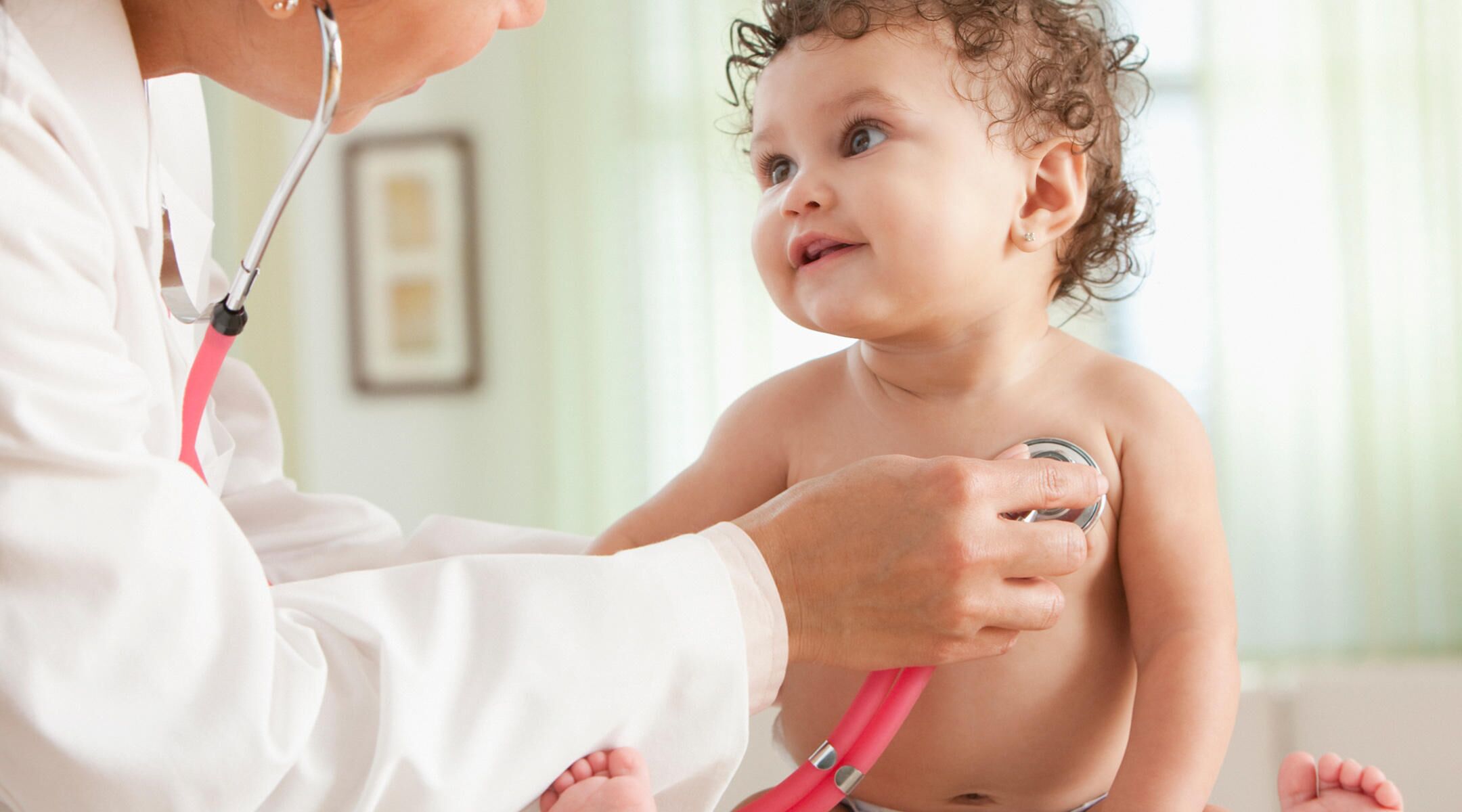What Happens During Baby’s First Newborn Checkup?
Baby will have quite a few pediatrician’s visits during their first year of life—but when will their first one be following birth? And what exactly happens at that first newborn appointment? Keep reading to get the lowdown from pediatricians on what to expect, questions to ask and how to prep for the big visit.
Baby gets a pretty thorough examination in the hospital nursery following birth, so when does their first official newborn checkup occur? They’ll have their first newborn appointment within a day or two after going home from the hospital, says Jessica Madden, MD, FAAP, IBCLC, a board-certified pediatrician and medical director of Aeroflow Breastpumps. This usually equates to day 3 or 4 of life for babies born vaginally and day 5 or 6 for those born via C-section. For babies born at home, Madden says their first newborn appointment should take place within the first 24 hours of life.
Baby’s first visit will be incredibly comprehensive, and there are two important things your provider will look at: baby’s weight and any signs of jaundice. “This first visit is crucial, because newborns are at risk for weight loss and jaundice in the first few days of life,” says Soniya Mehra, MD, MPH, a pediatrician with Stanford Medicine Children’s Health and Bayside Medical Group in Fremont, California. They’ll also review baby’s birth and screen you for postpartum depression via a questionnaire. Finally, they’ll go over infant feeding and sleep needs, as well as answer any questions you may have.
Baby’s physical examination at their newborn checkup
According to both experts, during baby’s first pediatric checkup, your provider will examine your little one head-to-toe, including:
Your provider will also measure baby’s weight, length and head size for their growth chart. While newborn weight loss following birth is common, your pediatrician will want to ensure they haven’t lost more than 10 percent of their birth weight, Madden explains. (Baby will start to regain weight within their first two weeks of life, the American Pregnancy Association notes.)
Plus, they’ll want to assess how well baby’s reacting to noises and sounds. Baby’s hearing is tested at the hospital following birth. But if baby didn’t pass their hearing test in the hospital nursery, your pediatrician will want to ensure that an “outpatient audiology follow-up for repeat hearing testing is in place,” Madden adds.
Jaundice screening at the first newborn checkup
As noted, baby will also be screened for jaundice, a condition caused by high levels of bilirubin—a yellow pigment in bile that naturally occurs as old red blood cells are broken down and processed through the liver, per Cleveland Clinic. According to March of Dimes, up to 60 percent of newborns experience some level of jaundice. For this reason, pediatricians look for any signs and screen all newborns’ bilirubin levels with a noninvasive skin test (known as transcutaneous bilirubin) or a blood bilirubin test, Mehra says. If the results are concerning, baby may be hospitalized to decrease risk of brain damage. While this sounds scary, know that when caught and treated quickly, jaundice is usually no big deal.
Sleep assessment at the first newborn checkup
It’s true what they say: Newborns pretty much only eat, sleep and poop for the first few weeks of life. “Since newborns are so young during this visit, there aren’t really any developmental milestones to measure,” Madden says. However, your pediatrician will want to hear about how well baby is sleeping. Specifically, your provider will want to discuss:
- How long baby’s able to sleep between feedings
- Where baby sleeps
- If you’re practicing safe sleep habits
- Ways to reduce the risk of SIDS
Along with sleep, they may also discuss other aspects of baby’s safety, including proper car seat use, avoiding tobacco smoke and ensuring parents and caregivers are up to date on their vaccinations.
Nutritional assessment at the first newborn checkup
Another important topic you’ll get lots of questions about at baby’s first checkup is their feeding habits and preferences. The experts note your pediatrician will want to know:
- If baby’s breastfeeding and, if so, for how long per session and how often
- How well baby’s latching
- If you hear baby swallow during feeds
- Whether you pump milk
- If you’re experiencing any breastfeeding problems or pain
- How baby’s formula is prepared
- How many ounces of formula baby drinks and how often
- How many diapers baby goes through in 24 hours
- How many times baby pees and poops, as well as what baby’s poop looks like
- If you’ve noticed any negative reactions to their formula or breast milk
All of this helps providers “get an idea if baby is getting adequate intake for their growth and hydration, and if lactation assistance is needed,” Mehra says.
Most newborns won’t get vaccinations at this visit, as they’ll have already gotten their first hepatitis B vaccine at the hospital following birth. (The second dose is given at the one-month checkup.) Mehra adds that baby may also get their RSV vaccine at this appointment if it’s cold and flu season, if their mother didn’t get it during pregnancy and if it wasn’t administered at the hospital following birth.
If baby does get a shot at this appointment, they may experience some pain, redness and swelling at the injection site, Mehra says, adding, they may also be sleepy, clingy or develop a mild fever in the first 24 to 48 hours after. However, if your newborn develops a fever of 100.4 or more, and acts fussier than normal, let your provider know.
With a tiny new baby at home, it’s likely you’ll have tons of questions at baby’s first appointment—and you should feel empowered to ask them! “I recommend parents come to the visit with any questions they have, as experience and knowledge about newborns vary among parents,” Mehra says. “Ask your doctor for any trusted sources for common questions; how to email questions and photos; plan for after-hours concerns; and what to do in an emergency situation.”
Below, both experts and the American Academy of Pediatrics (AAP) note some common topics parents ask about at baby’s first newborn appointment:
- Any and all questions related to sleeping and feeding
- Upcoming vaccines and baby’s vaccination schedule
- Whether baby needs vitamin D drops
- When baby can start traveling or being in public spaces
- Questions on baby’s poop and color
- How to best support baby’s head
- Baby’s vision development
- When to start tummy time
- How many diapers baby should be going through
- How long formula or breast milk is good for once made or pumped
- Baby’s umbilical cord care
- How often to bathe newborns
- How to safely check a rectal temperature
When it comes to preparing for baby’s first newborn appointment, you can expect the appointment to take anywhere from 30 minutes up to an hour, Madden says. Since you may need to undress baby for part of the exam, be sure to put them in comfortable, but easily removable layers, such a wrap shirt or pajamas. In terms of what to bring, experts recommend a diaper bag filled with changing and feeding supplies, a list of questions, baby’s vaccine card and a copy of their hospital discharge papers (just in case the hospital hasn’t sent them to your pediatrician’s office yet).
Baby’s next checkup really depends on how well they’re doing, as well as any concerns and follow-ups needed. “For example, a newborn with significant weight loss may be seen in one to two days. A newborn with significant jaundice may be seen in one day,” Mehra says. Without follow-ups or concerns, newborns sometimes are scheduled for a checkup at 2 weeks, but it isn’t always necessary if they’re doing well, Madden says. Beyond the two-week checkup, baby’s next newborn checkup will be at one month old.
In the meantime, don’t hesitate to reach out to your doctor with any questions at any point following baby’s birth. “Your baby is getting to know you, and you’re adjusting to caring for a new family member. Lean on your doctor for knowledge and support,” Mehra says. And don’t forget to take care of yourself, too.
Please note: The Bump and the materials and information it contains are not intended to, and do not constitute, medical or other health advice or diagnosis and should not be used as such. You should always consult with a qualified physician or health professional about your specific circumstances.
Plus, more from The Bump:
Jessica Madden, MD, IBCLC, is a board-certified pediatrician, lactation consultant and neonatologist at Rainbow Babies and Children’s Hospital in Cleveland, Ohio. She also currently serves as the medical director of Aeroflow Breastpumps, as well as the founder of Primrose Newborn Care. She received her bachelor’s degree from the University of Notre Dame and her medical degree from Ohio State University. She completed her residency in pediatrics at the University of Massachusetts.
Soniya Mehra, MD, MPH, is a pediatrician with Stanford Medicine Children’s Health and Bayside Medical Group in Fremont, California. She completed her medical degree at the University of Missouri’s School of Medicine Registrar and her residency at UCSF Fresno in California.
American Pregnancy Association, Average Newborn Weight
Cleveland Clinic, Bilirubin Test, January 2023
March of Dimes, Newborn jaundice, January 2024
Healthy Children (American Academy of Pediatrics), 1st Week Checkup Checklist: 3 to 5 days old, September 2021
Learn how we ensure the accuracy of our content through our editorial and medical review process.
Navigate forward to interact with the calendar and select a date. Press the question mark key to get the keyboard shortcuts for changing dates.

































